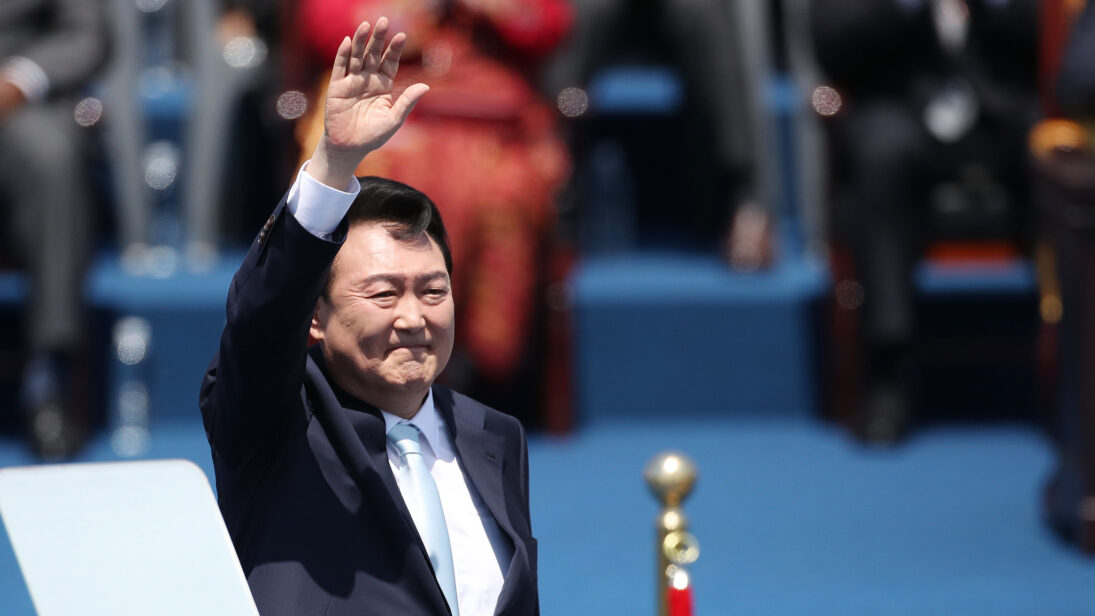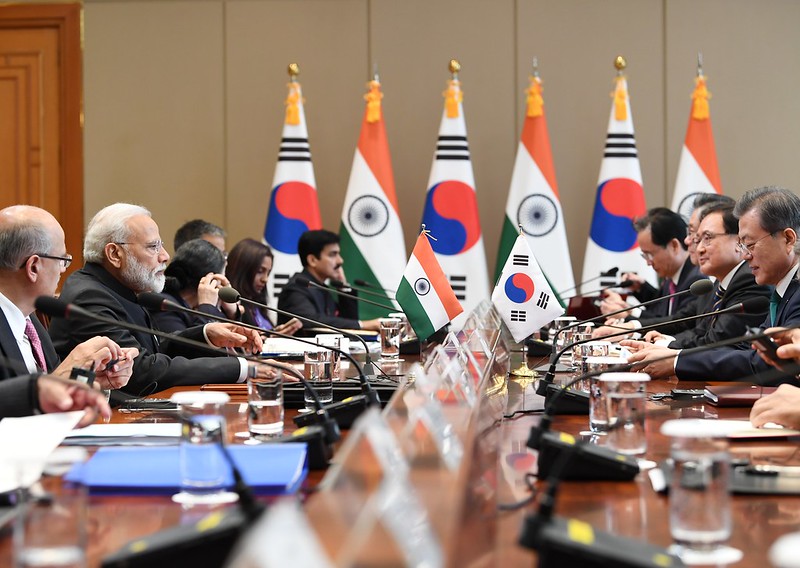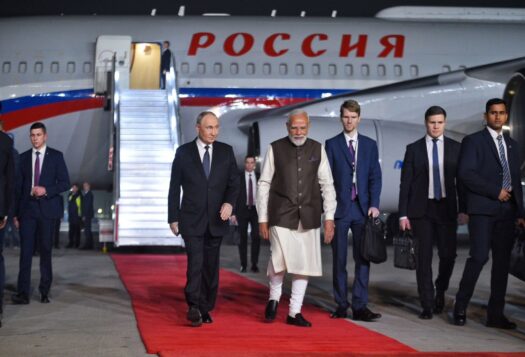
Since Yoon Suk-yeol took oath as the 20th President of the Republic of Korea (ROK) on May 10, 2022, many have expected him to pursue his vision for South Korea to expand its cooperation in the Indo-Pacific Region (IPR), aligning with the U.S. Indo-Pacific strategy. This strategic alignment with the United States would strengthen and consolidate ties with “like-minded” states in the IPR, particularly through enhancing new partnerships through groupings like the Quad. Yoon’s conversations with the Heads of State of Quad countries as President-elect already signal the importance he gives to the Quad’s vision. Yoon has reaffirmed this shift through his initial foreign policy decisions and diplomatic outreach. His new policy of strategic clarity opens avenues for cooperation with India in information and communication technologies (ICT), defense, and supply-chain resilience to build towards a prosperous, peaceful, and resilient IPR.
Yoon’s Foreign Policy: New Perspective and Renewed Alliance
Yoon’s foreign policy centers on “strategic clarity,” a policy focused on restoring trust in the U.S.-ROK alliance. In his inaugural address, he stressed the importance of liberal democratic values and the need to work with ‘like-minded’ countries to solve the challenges that democratic nations face. He also expressed the need for South Korea to align closely with the United States to maintain strategic stability in the IPR. The Quad is one structural mechanism that South Korea can strengthen ties with to pursue this goal of advancing a prosperous, peaceful and secure IPR. Yoon’s foreign policy shift is consistent with previous conservative administrations, as South Korea’s ties with the United States have historically been stronger with conservative parties, while Minjoo politicians have advocated for greater strategic autonomy.
With the Quad now expanding its scope of operation to focus on non-traditional security issues, Yoon has become more amiable toward working with the Quad, including expressing his intention to join the working groups of the Quad—and event the Quad itself—if invited.
Initially, South Korea’s perspective towards the Quad was constrained due to the Quad’s covert security focus, even though aspects of the grouping converge with the previous administration’s New Southern Policy, which focuses on three Ps: Peace, Prosperity, and People. With the Quad now expanding its scope of operation to focus on non-traditional security issues, Yoon has become more amiable toward working with the Quad, including expressing his intention to join the working groups of the Quad—and even the Quad itself—if invited.
Pursuing increased cooperation with the Quad gives Yoon another opportunity to get closer with the United States, India, and Japan on issues that dominate the region and provide a path for ROK becoming a bigger regional player itself. The opportunity to engage with the Quad helps South Korea to play a critical role in emerging technologies, cybersecurity, supply-chain resilience, and climate change. As the IPR becomes increasingly polarized due to China’s increasing military and economic influence, it becomes essential for ROK to align with the United States and work with other like-minded countries, like India, that share the vision of a free and open Indo-Pacific. However there obstacles still remain to South Korea’s smooth working relations with Quad. For one, the United States has noted that it does not currently intend to invite ROK to the Quad as a formal member, although may engage in other ways. Other obstacles include tensions with Japan, Indian ambiguity on expanding Quad, and most importantly the absence of domestic bipartisan consensus in South Korea on the Quad as a strategic partner.
Opportunities to Strengthen India-ROK Ties
Joining the Quad—or even engaging with the grouping through other mechanisms such as working groups or the “Quad plus” framework—would allow South Korea to expand its cooperation with India in new domains. India, meanwhile, can leverage these strengthened relations to stabilize the IPR further. Though the relationship between India and South Korea has previously centered on trade and commerce, defense relations are one part of the India-ROK partnership that remains under-invested in but show signs of growth. For instance, the Milan Exercise this year marked the first time that the South Korean Navy participated in a multi-naval exercise organized by India.
The defense relationship between the two countries also saw some positive developments in Indian Prime Minister Modi’s second term through high-level visits and agreements between the two countries. The initial deployment of 100 K9-Vajra a South Korean armored system manufactured by Larsen and Toubro at the border with China, and a plan to place additional order is symbolic of close defense ties between the two countries. In addition, after the withdrawal of French firm Naval Group from the P-75I project, South Korean firm Daewoo remains the only one capable in the race for a 43,000 crore (approximately USD $5.5 Billion) project. In 2019, Indian Defense Minister Rajnath Singh visited ROK to discuss bilateral defense relations to build a roadmap for cooperation in naval, land, and aero systems, Research and Development, and collaboration in testing, certification, and quality assurance.

Singh’s visit was followed by Indian Army Chief General MM Naravane’s visit in 2020 and Indian Air Force Chief Air Chief Marshal VR Chaudhari’s visit in 2021. Meanwhile, during his visit to India in 2021, the South Korean Defense Minister explored bilateral defense cooperation in new domains and also expressed his interest in participating in the defense corridor under the “Make in India” and aatmanirbhar bharat policies focusing on domestic defense manufacturing and exporting. The relationship between the South Korea and India has expanded to encompass cooperation in cyber security, information technology, and threats to maritime security from terrorism, extremism, and radicalization; however, there are potentials for future growth.
With its rising stature as an important global cyber player, India should pursue closer engagement with South Korea’s cyber domain for its strategic interests. Their cooperation in this space, which started in 2014, has now transformed into workshops, establishing joint network centers, memorandums of understanding, high-level meetings and strategic dialogues. South Korea is looking for secure, trustworthy, and resilient supply chains in countries that have yet to succumb to great power competition in Asia-Pacific. Therefore, a partnership with South Korea will be critical for India to attract and create an ecosystem for new growth in its ICT sector.
States like India and South Korea share a vision that goes beyond the narrative of great power competition, and focuses on the stability, prosperity and peace that is based on reformed multilateralism and a multipolar order.
Additionally, during a meeting with the Indian Ambassador, President Yoon asked for India’s support for South Korea’s partnership with the Quad and emphasized cooperating in new industries, such as advanced technologies and supply chains. Supporting South Korea’s membership in the Quad is in India’s interest because both the countries—as emerging regional powers—aspire to shape the norms, maintain stability and promote prosperity in the IPR. Hence the elevation of the partnership between India and South Korea in strategic domains will contribute to a secure, stable, and multi-polar Indo-Pacific region. This cooperation should first start from strengthening of bilateral relations and move beyond the economic domain into new emerging sectors.
Beyond Great Power
With new emerging geopolitical alignments, states in the Indo-Pacific are looking to consolidate and strengthen their relations with like-minded states, with China a primary reason for strengthen ties. However, states like India and South Korea share a vision that goes beyond the narrative of great power competition, and focuses on the stability, prosperity and peace that is based on reformed multilateralism and a multipolar order. With South Korea as an additional member, Quad’s structure and position would strengthen among the like-minded states who are feeling hesitant to express their concerns and insecurity regarding the changing geopolitical scenario. There are clear intentions, commitment, and convergences in India-South Korea relations, what remains to be seen is whether the will manifests into a robust and closer comprehensive strategic partnership.
***
Image 1: Republic of Korea via Flickr


